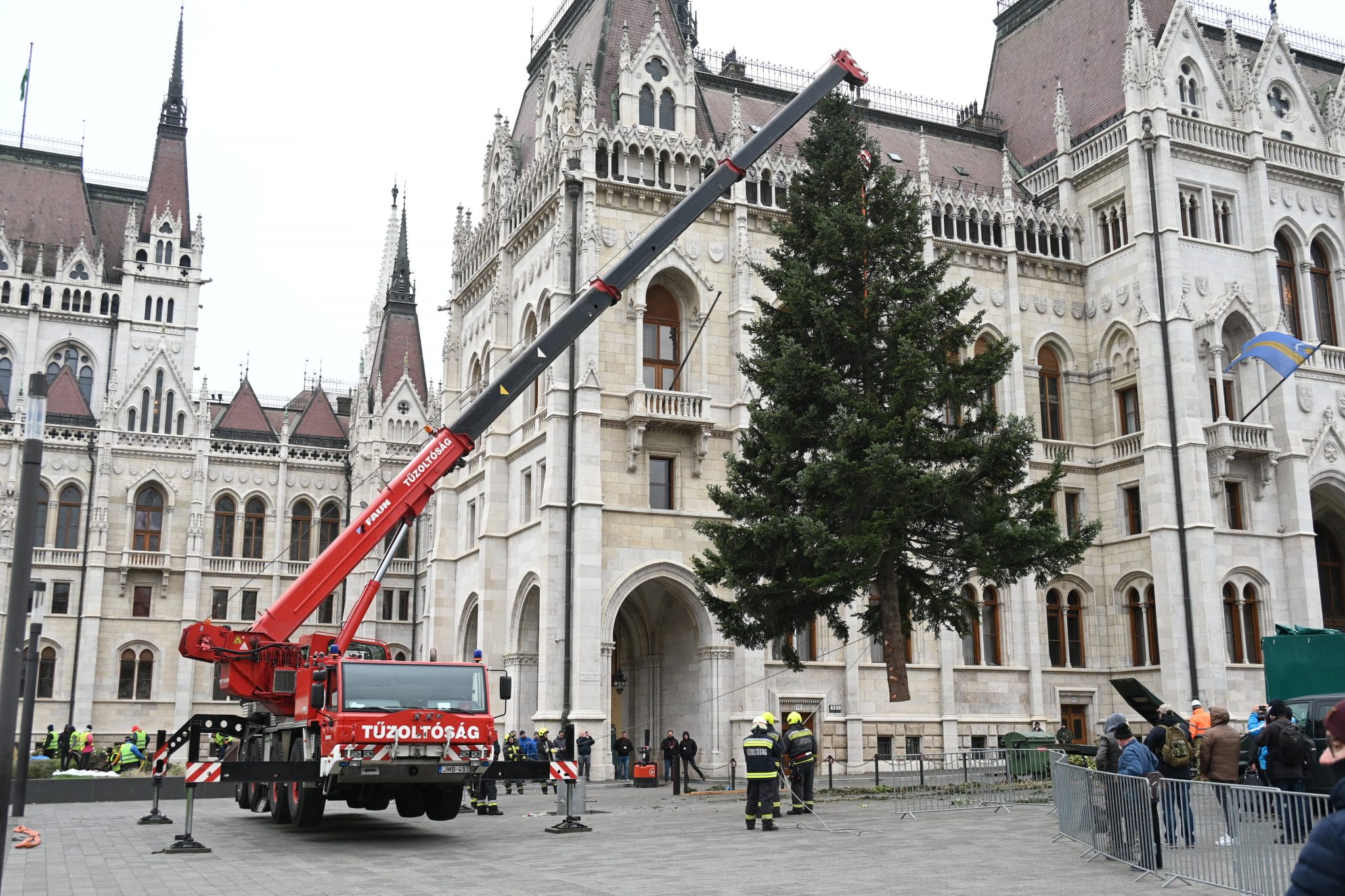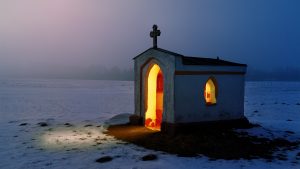
The 24-meter-tall pine has been standing in the garden of a family in Hajdúszoboszló for 40 years.Continue reading

This year’s Christmas sermon comes from the collection of the Hungarian Yeast Community (Kovászközösség).
“Rejoice greatly, Daughter Zion!
Shout, Daughter Jerusalem!
See, your king comes to you,
righteous and victorious,
lowly and riding on a donkey,
on a colt, the foal of a donkey.
I will take away the chariots from Ephraim
and the warhorses from Jerusalem,
and the battle bow will be broken.
He will proclaim peace to the nations.
His rule will extend from sea to sea
and from the River to the ends of the earth.“
(Zech 9:9-10)
How long will man hope? – writer István Örkény once asked the question in his short story, and I ask it today. How long do we humans hope? How long do we persevere? How long do we think that everything that happens to us, everything that happens in the world, however bad it may be, will one day turn out for the better?
I ask myself this question a lot, because when I look at the news, I find little reason for hope. In addition to the devastating news of the coronavirus, we read of tragedies, abuses of power, exploitation, the rapid destruction of the created world. Not to mention our own lives. The pain of a failure at work; the guilt of an ill-considered sentence; a personal conflict that has been going on for years, decades. In fact, it can hurt so much when we lose someone. Someone whose absence makes our daily lives infinitely more difficult, more empty.
Even the most desperate person can sometimes get discouraged and cry out to the universe: how much longer can I do this? What can I hold on to? What can I hope for?
The prophet Zechariah spoke to the people of Israel at a truly special time, in the aftermath of the Babylonian captivity (597-538 BC). The Babylonian captivity is a defining experience for the whole Old Testament. There are many passages in the prophets’ interpretations that reflect the suffering of captivity and the hope of release. It also permeated the prophecies of the Messiah of that time. They saw a ruler who would end captivity, bring deliverance and often do so by force, by defeating great powers.
It was these prophecies that gave the people strength and hope, and although it was not with the appearance of the Messiah that this happened, the captivity eventually came to an end. Those who lived there could finally return home and rebuild all that had been lost. It was both a physical and a spiritual rebuilding, and the two were concentrated in a single project, a single mission: the rebuilding of the Temple in Jerusalem. Israel was then given an unprecedented boost: almost everything was put together, every stone was moved, even the Persian Empire contributed a large sum of money.
Everyone was happy and hopeful, for with the building, it seemed that their faith could finally become a reality: that God was there with his chosen people, there in the Temple in Jerusalem.
But such a building is not easy to build. The initial enthusiasm faded, work slowed down, then stopped altogether. No one worked on the church for sixteen years. Everyone was tired and lost hope. Hope that God could really come among us. It was the prophet Zechariah who would not let it go. He did not let the people get comfortable with the thoughts,
“Why do anything? Why should we do good? Why build the church? Why hope? Why do all this if God is not coming, if he is not coming?”
At the center of his preaching – in our current passage – was a king. A king who, unlike previous rulers, lives in complete agreement with God. A king who is morally blameless and will show the way. Who rules justly and lifts up the fallen. Who triumphs over all nations and all difficulties and challenges. Who rejects the games of power, and comes on the back of a donkey’s colt among his people. At whose appearance the guns will fall silent, and his reign will bring a time of peace. A time of eternal peace where there is no more despair, no more pain, no more hopelessness.
For the prophet Zechariah, the guarantee of the king’s coming is the conversion of the people and the recovery of the momentum that will come from that conversion, which will build the temple in Jerusalem. The place where this king would arrive. We who are here now know that this King has arrived and will arrive again year after year. But not to the place where Zechariah’s contemporaries were waiting for him. Not to the temple, not even to a huge, magnificent royal palace, but to a dirty, cold, uncomfortable stable. Into the helpless, fragile body of a tiny child.

Photo: Pixabay
When István Örkény asked the question in his one-liner “How long does one hope?”, he gave an answer saying – “Now I know: until the last moment.” Although Örkény and many others like him use the term “until the end” to mean the end of our lives, I believe that the last moment comes when Advent is fulfilled. When our Lord, our King, our Savior, our Redeemer, Jesus Christ arrives. Truly and triumphantly, on the back of a donkey’s colt, crushing all the instruments that can cause pain, and giving eternal peace to us all. An eternal peace that reaches from sea to sea, from the farthest reaches of the earth to our hearts.
This is our hope. It is what gives us strength in all times and lifts us up to the last moment. At the coming of the Lord. On Christmas Day. Amen.
Almighty Lord!
Come, be with us when we are gripped by despair, sadness and a sense of hopelessness.
Come, come among us and be the ruler of our world.
Come, bring us your justice and your triumph.
Come, strengthen us in humility and remove all that is evil.
Come with your eternal peace and fill our hearts with the Life that you have given us, which conquers death.
Amen.
Featured Photo: Pixabay